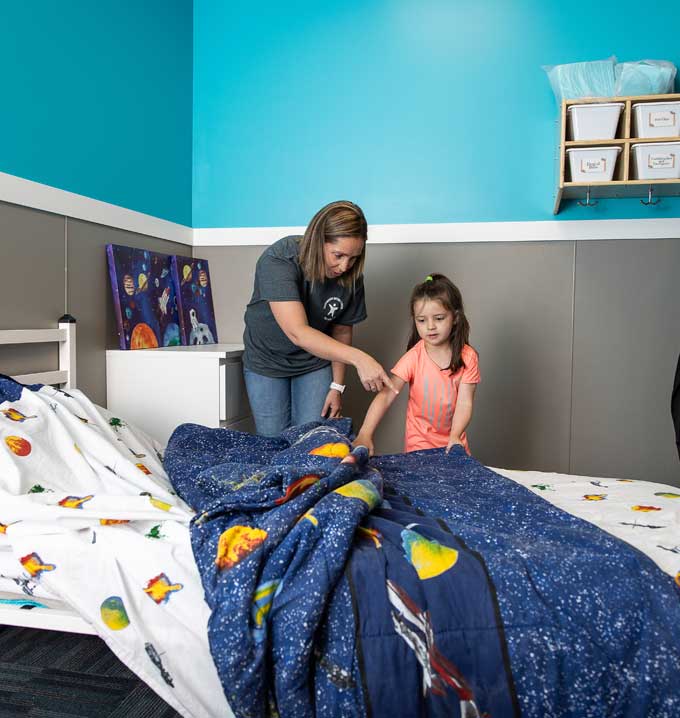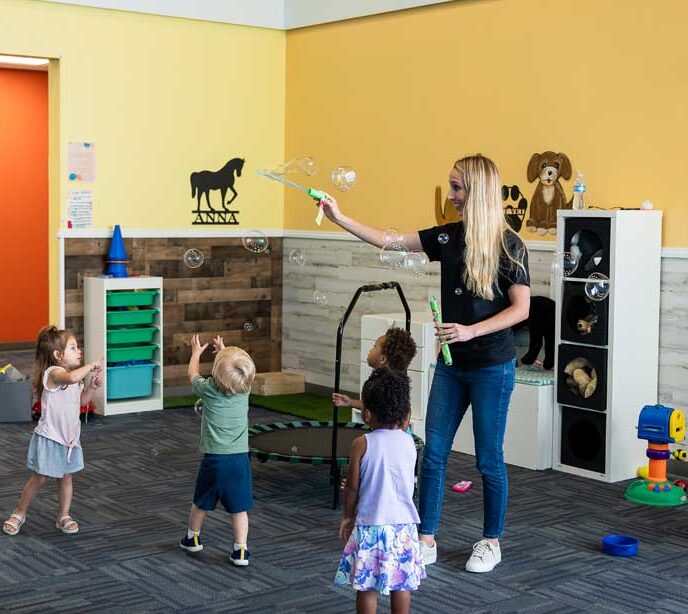Simple Autism Routine
We take a look at the benefits of a simple routine for autistic children and how to create a straightforward schedule for a higher chance of success.

The Benefits of Simplifying: Creating a Routine for Autistic Children
Routines are important in everyone’s daily life. They help us to stay organized and complete essential tasks. Daily routines are useful for all children, but they are especially important to help children with the challenges of autism in everyday life.
Establishing solid, simple routines at home and at school can help reduce stress for parents, caregivers, and children. They also help to teach and establish different life skills.
We’re going to take a look at autism and routine and how to build a simple schedule for your autistic child that will bring stability and calm to their everyday life.
Why is routine so important for autism?
Do autistic people like routine? Yes. Routines bring a level of comfort and stability to everyday activities that, otherwise, could be overwhelming. Consistency and predictability are valuable tools for an autistic child. Repetitive patterns reinforce positive behaviors and important life skills.
Here are some of the more obvious benefits of developing a simple schedule for an autistic child.
Reduces stress
Routine is a stress reliever for everyone — knowing what is expected of you at a certain time makes things more predictable. Autistic children can be overwhelmed easily, and routines help them to become familiar with their surroundings and expectations. They also help to improve confidence that they can achieve the tasks ahead of them.
Assists with transitions
Many autistic children simply don’t like change, and what can be extremely exciting for other children could be extremely stressful for an autistic child. Putting a routine in place before a transition helps children to get used to their new environment and expectations.
Nurtures a learning environment
While allistic children might easily retain information when learning new daily living skills, autism makes it difficult to remember and repeat skills straight away. For kids on the spectrum of autism, a schedule can help them practice and remember new things.
Gives them a sense of ownership over their day
It’s frustrating when you can’t explain what you want or achieve something that you’ve set out to do, and autistic children experience this daily. Establishing a routine helps to give them a sense of ownership over their day, especially when they get to a level of independence where they can take on some of the tasks on their own or make their own schedule.
Builds stronger connections
Autistic children can struggle to connect with parents, teachers, caregivers, and friends. However, as their sense of purpose, fulfillment, predictability, and security increases, their stress and anxiety decrease. This can make them more receptive and able to connect with others.
Creating a schedule for your child
Before you begin, it’s important to remember that simplicity is key. Your child is not going to follow or learn from an overtly complicated routine. So, strip it back and create a straightforward, easy-to-follow routine using the following steps.
Identify the most important tasks in their daily routine
A successful schedule is a simple one. Outline the tasks that you classify as the most important for your child to complete during the day. Write them down. Start with just a few at the beginning, and you can always add more once they’ve mastered it.
One of the common challenges of autism is difficulty following instructions, so ensure that all of the steps are predictable and specific.
First, give the task a name, and then break that into smaller, more manageable instructions for your child. For example, the bigger task could be “Get ready for bed”, and you can break it down into smaller steps such as:
- Get into pajamas
- Brush teeth
- Listen to one bedtime story
- Turn off the light
Be patient and figure out what format works best for your child.
Assign times and alerts
To ensure that the routine is predictable and on schedule, it’s important to assign every activity a time and preferably an alert that will remind you and your child. Alerts can help to diminish the monotony of a schedule. You can use fun alerts, such as animal noises, on your phone and assign a different alert to each task. This gives your child the chance to recognize what the alert is signifying and either tell you what needs to be done or attempt the task on their own if they are ready and capable.
Make it visual
Simply writing down the tasks and steps isn’t enough. In many cases, autistic children learn and respond best to visual cues. So, it’s essential that you make your schedule more than a simple list. Take pictures of your child doing the tasks, or print a picture of the task and put it next to the instructions on the schedule.
Refer to the schedule throughout the day
Don’t expect your child to remember what they are going to do at the end of the day. Instead, refer to the calendar throughout the day and remind your child of what is going to happen next. For example, remind them while they are crafting that they are expected to clean up their craft materials once they are done.
Use positive reinforcement
Everyone could use a bit of positive reinforcement, and you should let your child know how well they are doing when they get a task done successfully. Of course, how you do this depends on your child’s individual nature, but putting gold stars next to a task on your visual schedule or something similar is a great idea. Do whatever it is to let them understand that you are proud of them.
Patience and persistence
The first couple of days with a new schedule can be challenging for both of you. Consistency is key in the beginning, and you need to ensure that you tick off all the steps in order. Repeat the routine in the same way every day and remain patient. It’s all worth it once your child starts to get the hang of it.
Once the routine is firmly established, you can start to alter things a little bit at a time. Try to involve another family member or caregiver in the routine, or slowly introduce an additional step if you would like. As much as a consistent routine is important, it’s also a good idea to get them used to change and transition while they are comfortable, as this will be a valuable tool for the future.
Learn about routines, schedules, handling change, and more with LAC
Lighthouse Fusion ABA Therapy is an innovative approach that combines the best ABA therapy practices with speech therapy to create a unique model that delivers exceptional outcomes for autistic children. With our decades of experience in the industry and a wide array of autism resources that are available to you, we aim to equip you and your child with the right tools to tackle everyday activities that will set them up for a better future.
Together, we can unlock your child’s potential
Related News

03/07/2024
Symptoms of Asperger’s Syndrome – Lighthouse Autism Center
In this article, we take a look at Asperger’s syndrome, and describe its most common characteristics, how it differs from other autism disorders and how to treat it.

03/07/2024
ABA Therapy: Costs and Options – Lighthouse Autism Center
One of the most recognized treatments for autism is ABA therapy, but this comes with questions about costs and financial viability. Discover ABA therapy costs and explore the various options available to you, ensuring you’re equipped to make informed decisions for your family. Resources Available to Help Cover the Costs of ABA Therapy Services As […]

03/07/2024
Free Online Games for Autistic Kids – Lighthouse Autism Center
The virtual world can be a great resource for autism-friendly games, providing both a learning environment and an outlet for fun. Discover the benefits of online games for autistic children, and explore our top picks that cater to different needs and skills. Free Online Games for Autistic Kids The virtual world can be a great […]


